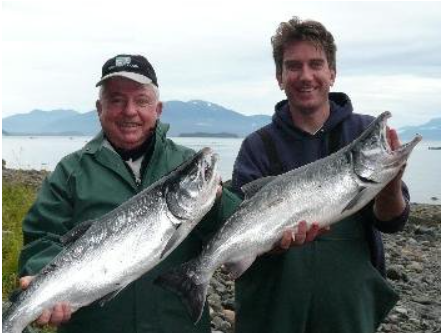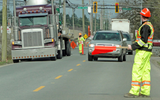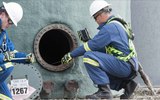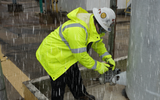What is the Best Protection From Lead Dust?
A customer recently wrote to us asking about protection from lead dust. Here is his question, and our response:
I have been melting lead wheel weights as well as other sources of lead for fishing weights (bouncing Betty's) as small as 1 oz and as big as 2 #'s – also round downrigger weights from 1#, 2# ,4#, 5#, 7#, & 10#, and 10,12, and 15# downrigger weights with keels.
I have also made triangular anchors from 4# and as large as 40#. as well as tons of #7 & #8 shot for trap shooting.
I have been doing this for over 10 years without using much protection (including common sense) except fairly good ventilation.
About 2 years ago, my bad habits caught up to me and I nearly succumbed to lead poisoning. Now, I've got about two tons of ingots and customers for all of it but I am still leery about getting close to the stuff.
It seems that nobody in the area where I live knows anything about what precautions you should take (even when they're selling the stuff) Would it be possible to send me a list of what I should be using for max. protection.
I'm working about 15 miles from home with no water except what I carry so I thought I should have my darling pick me up and give me a ride home in back of the pick-up when I've had enough - I have a canopy After I blast myself clean (would hot or cold water do the job ??) I could have my darling take me back and we could go thru the same routine in the morning until I was finished.
Thanks
Bob R.
From PK Safety:
Well Bob, you are right to be concerned about lead dust and the dangers of melting lead for fishing weights and shot. And you're not the only one who has been doing it so long they almost forgot it was dangerous.
There are some fairly simply ways to greatly reduce that danger. Good ventilation likely saved you from doing yourself more damage in the past. As you move forward with your plans to dispose of your stock of lead ingots and scrap, ventilation should continue to be part of your protection.
Always try to blow clean air into your work area as opposed to trying to blow it out. Preferably you'll have a blower/ventilator on one side of your work area, and a wide open way for that contaminated air to escape on the other side.
For lung protection, you want filters or cartridges that meet the P100 (HEPA) standards. HEPA stands for High-efficiency Particulate Air, and filters meeting this standard are able to remove 99.97% of all particles greater than 0.3 microns (or micrometers) from the air passing through it.
We often recommend our 3M 6000 Series Half Facepiece Respirator with 3M P100 Particulate Filters. 3M makes a more comfortable mask made from silicon that is much more soft and flexible. And for lots of jobs the 3M 7500 Series Half Face Mask is preferable because it's so much more comfortable for extended projects.
The good thing about the 3M 6000 series mask is it's not that expensive, and you won't be too broken up about disposing of the mask once your project is done. And that's just what we advise. Lead dust will stick to the mask, and you'll never get it all off even if you clean it well. Later on if you use it again, you'll touch it with bare hands or the dust will be knocked off and all your caution spent in this project is out the window.
It's also a very good idea to protect your skin from contact with the lead dust, especially if you're moving lots of it. DuPont makes disposable protective coveralls that are designed to keep dangerous particles - such as lead - from getting to you. These coveralls are also something you'll want to get rid of once your project is over. Also, it's a good idea to order these one size too big, as real work tends to involve more squatting and twisting than these things can handle when they are snug.
Gloves are also highly recommended. We recommend simple palm coated gloves like the MCR Safety 9688 Flex Tuff II gloves. They're also inexpensive, protective, and have a grey latex coating that makes getting a good grip on things easier. One good tip is to tape your gloves to your Tyvek suit once you get them all on. It will keep everything covered even when you are reaching and working.
You've definitely got the right idea about protection. Please let us know if you have any more questions. Or if you've caught a bunch of fish and are looking to give some away. We are available by phone 7am til 5pm PST, or during those same hours online at pksafety.com.
Recent Posts
-
Promoting Safety: National Work Zone Awareness Week is April 15-19, 2024
Each year, the National Work Zone Awareness Week (NWZAW) places the spotlight on the importance o …Apr 11th 2024 -
Understanding 4 Gas Monitors: How They Work & Why They Are Important
In today’s increasingly dynamic industrial landscape, 4 gas monitors have emerged as critical com …Apr 8th 2024 -
April Showers Require Workers to Wear Hi-Vis Safety Rain Gear
While April showers bring May flowers, they also bring challenges, particularly for those working …Apr 1st 2024





